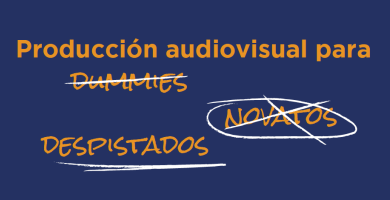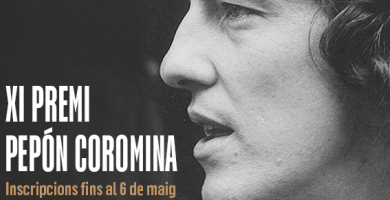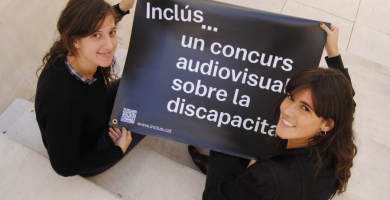
Adriana Pérez and Marta de Muga: "We always defend the idea that the films that we choose for the official selection are worthwhile. And if it wasn’t for Inclús, no one would see them."
This month we interview Adriana Pérez and Marta de Muga, directors of Inclús, Barcelona International Disability Film Festival. The Festival will be held from 26 November to 1 December at Caixaforum in Barcelona and is finalizing the details of this year’s festival. We talked to them about the festival and about disability in the audiovisual world.

How was Inclús created and what is its main objective?
Adriana: Inclús was the idea of the Visual Disability Catalonia Association which is devoted to direct care for people with visual disability. They wanted to have a show which would raise awareness about the disability. But it was a bit much for them, since they are a direct care organization. The first year it lasted one day at the Girona cinema and was called Disdoc. In the end, it was a small show of films from organizations.
Marta de Muga: Despite the fact that it was very good, it was really just thanks to their members. The whole audiovisual part was missing. We are a production company and we knew each other thanks to a documentary that we were making.
A: They asked us whether we would be interested in participating. As a production company, we had always seen festivals from the other side. We knew the channels more or less and it was just a case of taking on the other role. That was in 2014. First of all, we changed the name, since it is not only documentary; there is also fiction. And this gave rise to Inclús.
How did you go from being producers without experience in organizing a festival to actually doing it?
A: It is very difficult to create a festival. From the beginning to the end, the funding, the lack of knowledge, the fears, the fact that it is a very specific festival, whether there will be films or an audience each year.
M: It doesn’t sell itself.
A: On a Saturday, would you go to see a film about disability? Maybe it’s difficult if you are unfamiliar with it. But we like challenges.
M: What is true is that we had contacts with other people who organize bigger festivals and who have been in this longer and who supported us. They gave us advice; we talked with a lot of people. They encourage you to go ahead. And the success each year also encourages you to continue.
You have been doing this for seven editions now. What is your overall assessment of the festival so far?
A: We are very happy, because it is becoming increasingly popular and more and more people are coming to see it. At the beginning they were more familiar faces, whereas now you see new faces, the cinemas are filling up, people call us to do workshops.
M: There are very specific films; I suppose that this happens to all festivals, that they have to have a platform in order to be seen. We always defend the idea that the films that we choose for the official selection are worthwhile. And if it wasn’t for Inclús, no one would see them.
What are the requirements for a film to be able to enter the festival?
A: Above all, technical quality. In the end it is very simple; it must be a good film and then, since our theme is people with different abilities, the subject must be dealt with in a respectful manner, from a different viewpoint. And it must awaken something in you. Inclús has two very different audiences: an audience with different abilities which can enjoy accessible leisure and an audience which likes to go to the cinema and whose awareness can be raised by the film. For this audience, you need to films with rhythm.
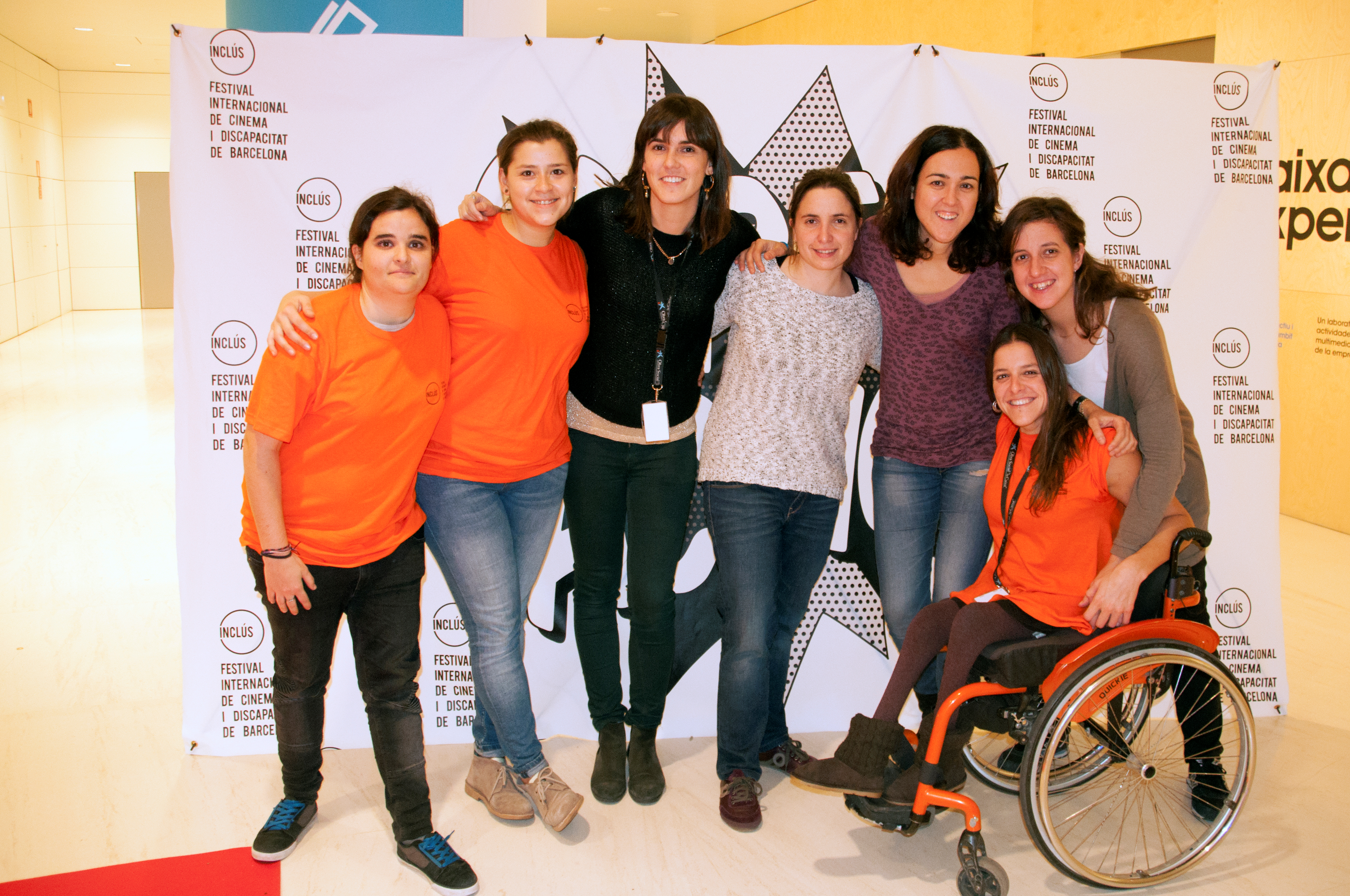
The people who come only see the outside part, but there is a lot of work which is not seen. What do you think the main problem is when it comes to organizing a festival?
M: The funding. People are not aware of the work that this involves. For us it is work all year round and the team is extremely small. It’s a Catch-22 situation: you want to form a bigger team, but you need more funding. It is also true that you do not just depend on public money or private money, but the situation is what it is. The public institutions only just have enough as well. It is all very complicated despite the fact that there is a great desire and will to get things done, and in our case also because we believe that it is necessary.
A: We have now carried out the production of another festival in Reus where we have a fixed price. Last year was the first one that we did. It’s completely different doing it with a budget rather than starting from scratch, when you have to perform a thousand miracles. As we know how it works, we can do even more.
M: In our case, a large part of the general budget goes on accessibility which is an item that many festivals do not have, or actually almost none has and which for us is essential. It represents maybe 40% and we cannot avoid it. We do not alter this item. Making an audio-description for all the films, subtitling for the deaf, having a sign language interpreter. This is a handicap which only we have. If only they all did it.
I believe that awareness will go in this direction and that there will be festivals and producers who move up a gear. But it’s complicated at the beginning. The Generalitat has language policy subsidies for using Catalan in dubbing and subtitling. And we come along and ask: “And what about audio-description?”. It is not dubbing, it’s an extra voice which narrates the film, but you also use Catalan. Now they help us a little. It’s a step which we hope will increase.
Does audiovisual in general and film in particular take people with a disability into account?
A: Each year we look for an inauguration film which is more commercial and we find it. But I wouldn’t say that they take it into account. They are big films like Wonder, from two years ago, which is a super-production and has a book. Last year it was Champions which is also good, but it stays on the surface. Disability is not dealt with in any other film; you do not see actors with a disability.
M: The representation is what is most complicated, rather than making films on this subject. Some exist like The Untouchables. And it is true that Champions opened up a path; they gave the Goya to Jesús Vidal and it appears that they are taking it into account. The question is, and now what happens? Will Vidal have more work? We’ll have to wait and see.
A: The view of a person with different abilities in films tends to always be fairly negative. If you think about it, all of the villains have some sort of disability, like Captain Hook, for example. There is a stigma, as there is around the subject of mental health.
Do you believe that society is sufficiently familiar with disability?
A: Yes, some things are being done. It is slow and, depending on the age group that you ask it is different. If you talk with the elderly, they still use words like handicapped, although this is also logical because they did not have the same education. You will find things which frighten you among young people, but there is more awareness.
M: There are also many invisible problems. Mental health, above all. And if you do not have any contact with disability, you do not know how to deal with it either. Inclús is also useful for this; it is one of its objectives as a festival.
Inclús also offers educational workshops for students and the general public. What are these workshops?
A: They vary. We have held sign language workshops because they work very well and people request them. The deaf community is a group which speaks another language and it is very difficult for us to communicate. We can offer some insight, because in a workshop lasting a few hours you cannot do more. And we have many awareness-raising workshops for children. We select four animated short films and we hold a cineforum. We also do this with teenagers. And we hold another with advertisements and how they treat disability with a subsequent debate. There is also a more sensorial one which is called “Let’s feel film”. We take two shorts. We take the sound off one and we put subtitles and they see the film like a deaf person sees it. With the other one we take off the image and we put the audio-description. It is more interesting to carry out this activity with people who are deaf and people who are blind, because it is us who are disabled at that time, since we do not have the different abilities.
M: We really like to be in contact with entities which work with people with different abilities, who are those who experience this on a daily basis. We talk a lot about what they want, and sometimes they give us proposals. There is a lot of communication. We always hold an R&D workshop as well. About how technology adapts to people with different abilities. There are people who are designing tools or devices, computer sign language translators, glasses which position you in space and detect objects. This is possibly the workshop least related to film, but it is very interesting and very successful.
These workshops have also come out of the festivals and you offer them in primary and secondary schools, for example.
A: In secondary schools, primary schools, civic centres, in the occasional library or other festival, such as Clamor and Breus.
M: As the festivals only last a few days, for us it is perfect that they ask us to do other things. This year, with the ONCE, we will offer an activity for Santa Llúcia. We have also done some screenings to deal with specific issues.
A: In the Girona cinema, taking advantage of the fact that we already had a cinema which is accessible. We repeated the best films or some guests who fitted in.
Are there many accessible cinemas in Barcelona?
A: We hold the festival in Caixaforum, because it is a place where 15 or 20 chairs can enter. You can’t do this in any cinema. The maximum is from two to four and in front of everyone or behind. In Caixaforum they have spaces in front and behind, but as the screen is so big the visibility is perfect and moreover behind it is next to the bathroom. It is very convenient. But there are no accessible cinemas, although there are some which have initiatives to help inclusion.
M: The accessibility of films is not just the physical space. For example, we defend the idea that the subtitles should all be for the deaf. We all like the original version, but if we are watching a film in Polish and you’re already going to have subtitles on the screen, why not put them in colours and incorporate the sounds? Because it doesn’t make any difference to us and a deaf person will understand more. I think that this could reach cinemas. Audio-description is more complicated. We do it with a mobile app, but then people say: “Oh, phones in the cinema”.
A: The ONCE has an app for the audio-description of films and it is only a question of synchronizing it with the screening. You can go in late and it is automatic.
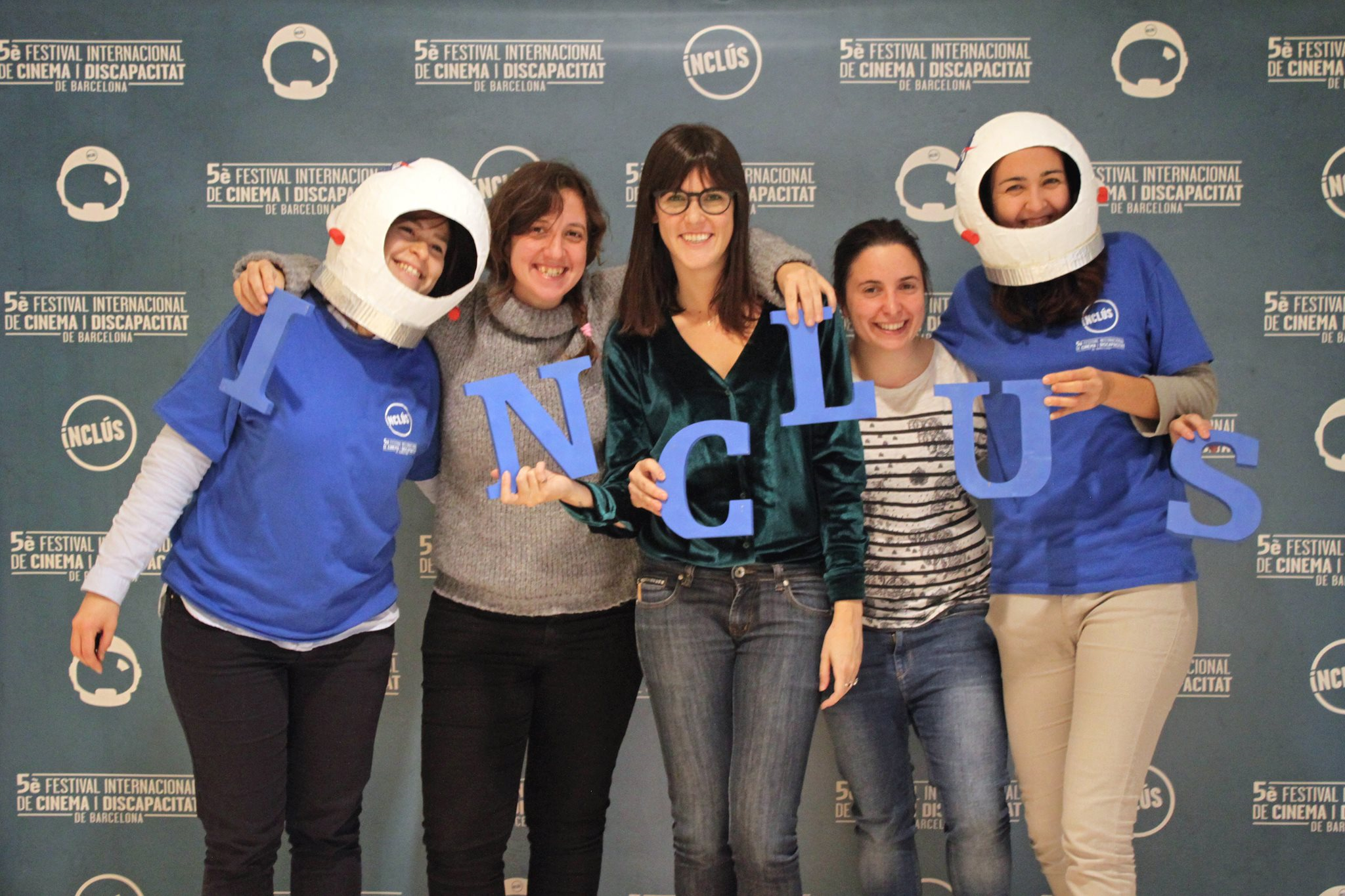
And does the industry do it?
M: The step has to be taken before. This would begin to work if on television, for example, they said that such a percentage of the programmes must be accessible, but it’s difficult. We do the audio-description and subtitling of films. We understand that it costs a lot of money and that there are productions which maybe cannot allow it. But we always ask, before doing all the work, whether they have these materials, and there are people who do not even know what we are talking about. Then they ask us for it to use in other copies. Nobody taught us. We studied film and we didn’t have any idea. But we made a documentary about a girl who was losing her sight and when we finished shooting, she had lost it completely and it was like: “Oh no, how can we let Maite see it?” So, we got to work. In Inclús we have held audio-description workshops for film students. We tell them that they have this tool which they can use to gain a broader audience. That we are forgetting about these people.
The festival includes the award “Ponte en nuestra piel” [Put yourself in our position] together with Arep in order to encourage the production of amateur shorts. What does it consist of?
A: We have a section for professionals and, then, Inclús is obviously a place where all the entities which deal with different abilities must fit in. We joined forces with Arep, an organization which works with mental health, and we organized this competition. Since it is a direct assistance organization, we look after the audiovisual part.
M: The organizations register and have a few months to work. The idea is to make a video which is not about this but which shows that they have worked on another disability which is not the one of their organization. If they are given cystic fibrosis, they have to see what it is. Maybe they contact the Cystic Fibrosis Association of Catalonia. It’s nice because in the end it’s a question of putting ourselves in the position of everyone else, not just of a few.
And the award for young people?
A: The competition works very well, but it was just in organizations concerned with different abilities. We said that it should be done with young people and with the subject of mental health, because then Arep can hold awareness-raising sessions, talks, a young person from the association can collaborate with the schools or the youth clubs. This is under way because we had the idea this year.
This year you are participating in the Pantalla Barcelona cycle with the selection of several works which are shown on the screens of the city’s civic centres. What do you think of this initiative?
A: It’s a very good idea which brings all the culture to the neighbourhoods. It will also mean that many people who cannot afford to go to a festival or do not normally go will be able to see these films. It helps in two ways: it presents the films and it offers them a second life.
M: It is also good that they are invited to feature films and shorts. Because it is even more difficult for shorts to reach an audience. It is good for the producers, the creators and also for the public.
You can check the programming here.





